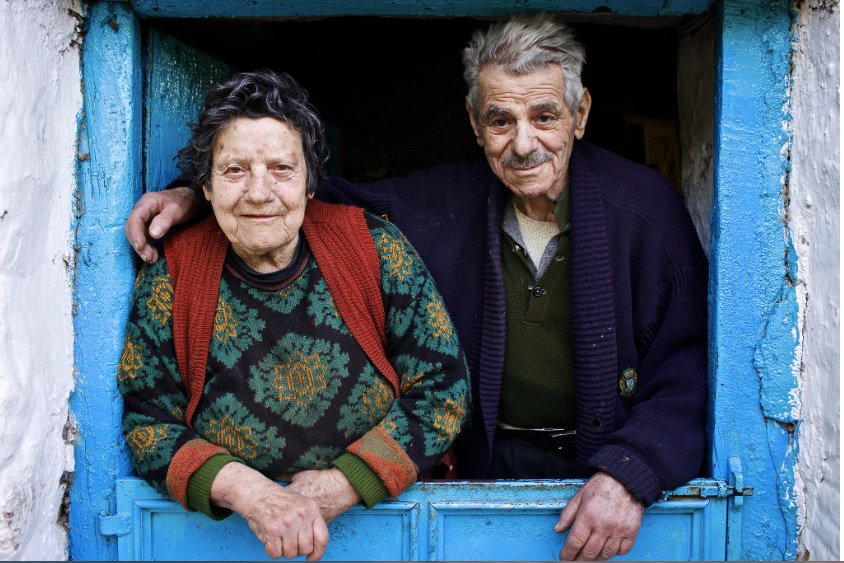
Maybe it’s the crystal blue waters and rocky shores against a mountainous backdrop, idyllic to any discerning traveler’s eye, or that the old simply forget to die, but Ikaria, Greece is like few places on this planet. With octogenarians who can boast being married for sixty-five years, and most of the community walking at least a few kilometers a day, there are a few immediately apparent hints as to why people outlive those in our own countries. Other secrets of the locals are harder to unearth.

Image credit: National Geographic
After all, Ikaria may look post-card perfect, but it isn’t much different than many other Greek isles, or for that matter, much of the Mediterranean. Ikaria is about 30 miles from the Turkish coast, but people here live at least a decade longer, on average, then anyone in Turkey, Monaco, Italy, Spain, France, or mainland Greece, let alone the U.S. or other industrialized nations. The many 100-plus residents aren’t just existing into their old-age, they thrive. Many of them are still physically active, mentally astute, and an active part of the community.
Ikaria is rare indeed. It joins just a handful of other countries called Blue Zones where people consistently live much longer than their American and European neighbors. These include: Okinawa, Japan; Sardinia’s Nuoro Province, the Nicoya peninsula in Costa Rica, Loma Linda in California (where there is a high concentration of Seventh Day Adventists), and Ikaria, Greece.
Ikaria has the largest number of ninety-year-olds on the planet – so how do they do it? It turns out they share a few commonalities with other cultures, even though the Blue Zones are spread across the planet. The things that Ikarians do to stay young and vital might be surprising, too, since they don’t take a million medications, have extensive surgeries, or even nix every bad habit. One of Ikaria’s ninety year olds that was interviewed by National Geographic was even a smoker.
Diet Matters
Ikarians eat lots of potatoes and beans. They also eat what looks like a weed called horta. Horta hasn’t been scientifically evaluated for life-sustaining properties but the locals swear by it. They also eat a ton of other greens including black mustard, dandelion, wild sorrel, chicory, fennel, chard, kale, mallow, black nightshade, lamb’s quarters, wild leeks, hoary mustard, charlock, Smooth Sow-thistle and even the fresh leaves of the caper plant. Wild edible plants are used often in cooking, too.
Ikarians Believe in Drinking Red Wine, Taking Naps, and Having Sex
While this sounds more like a recipe for a hedonist than a centenarian, those old fogies are likely on to something.
Wine has high levels of polyphenols and antioxidants. It can also help to lower cortisol levels, a hormone associated with stress. If you drink a glass of wine with an Ikarian meal, it about triples the flavonoid absorption. Usually, they don’t have more than a few.
Taking naps – well there’s loads of studies showing this singular habit can do everything from alleviate our sleep deficits, to boost our brains, including improvements in creative problem solving, verbal memory, perceptual learning, object learning, and statistical learning. Naps also improve our ability to learn, manage our blood pressure, and lower incidence of stroke, or heart attack by 37 percent.
What does having sex do for you besides relieve stress and make you feel amazing? How about this – people who have sex a couple of times a week tend to have higher amounts of the antibody immunoglobulin A (IgA) than those who have sex less than once a week. It’s also a form of exercise that’s good for the heart than running on a treadmill. It decreases negative menopause symptoms in women, and increases oxytocin to reduce pain. This also calms the nervous system, and reduces cortisol which can wreak havoc on the body over time.
Exercise Isn’t the Same in Ikaria
The people who live into their nineties in Ikaria definitely exercise. They walk everywhere. They work in their gardens. They use hand tools. They kneed bread by hand. Their physical activity is unconscious, but it’s done every day and integrated into their lives so seamlessly, they’d probably laugh to see what we do at the gym.
The Intangibles
Ikarians are also fun-loving, jolly people who connect with each other instead of stare at a cell phone or computer screen all day. Hosts of scientific literature suggest that our connection to others, alone, can give us a reason to live.
“Being socially connected is our brain’s lifelong passion,” says Matthew Lieberman, a professor of psychology in the UCLA College of Letters and Science and a professor of psychiatry and biobehavioral science at UCLA’s Semel Institute for Neuroscience and Human Behavior. “It’s been baked into our operating system for tens of millions of years.”
Ikarians are also self-sufficient people who live a traditional way of life. As one travel site describes the island,
“Ikaria seems to laugh in the face of modern life — the greedy rush through time, the loss of identity through globalization and homogenous life styles, consumerism, materialism and an official, or unofficial police state that observes and dictates the rules of living where there is meant to be freedom.”
If we want to live longer, and fuller lives like the men and women of Ikaria, Greece, we’ve got a lot of changing to do – but the take away? It’s totally doable.
Source: The Mind Unleashed














COMMENTS